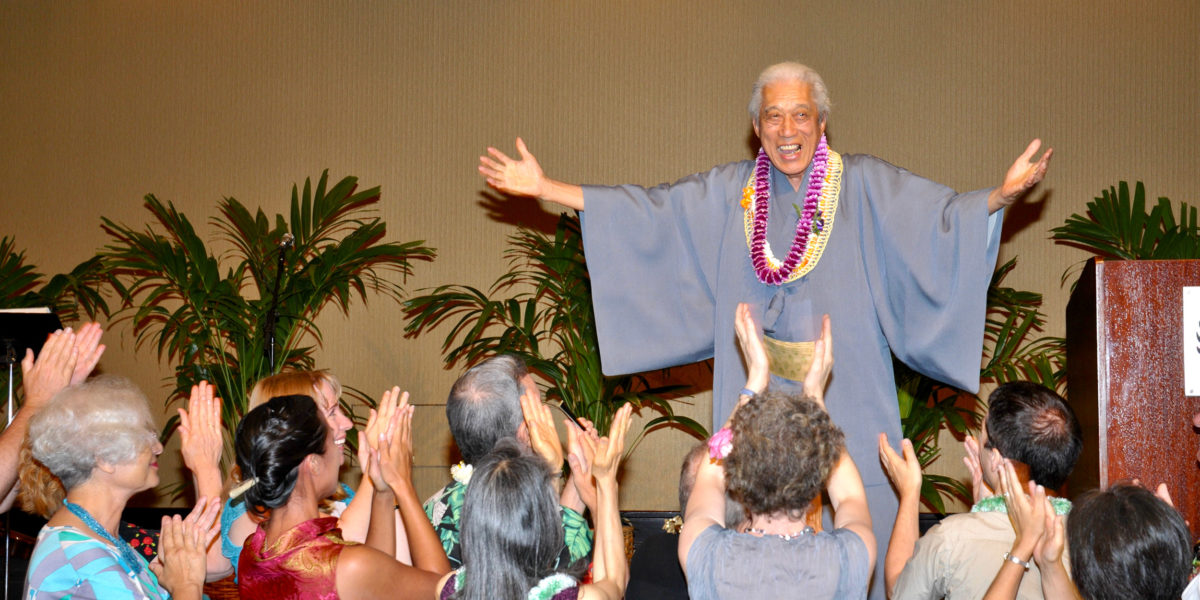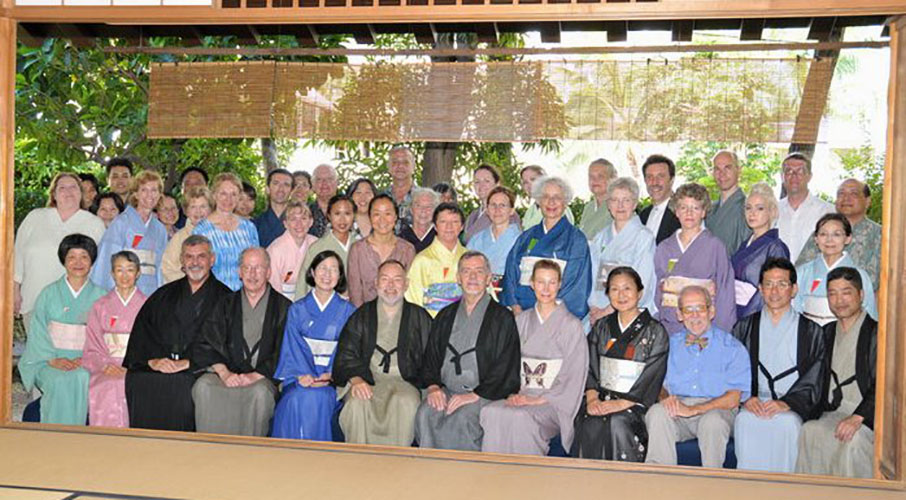At the Urasenke Midorikai Alumni Association’s 40th Anniversary Reunion General Meeting
Good morning, ladies and gentlemen.
It is a great honor and a privilege to be here with you in the presence of the Great Grand Master Hounsai to celebrate the 40th Anniversary of Midorikai. It is truly a realization of my dream. When I see the Great Grand Master and all of the 60 alumni of Midorikai, whose faces have been imprinted deeply in my heart, I feel as though I am attending a family reunion.
I sincerely hope and believe that the newly established Alumni Association would flourish and prosper, further deepening your bonds, so that your activities will continue 10, 20, 30 years into the future, and into eternity along with the Urasenke Family.
It was 40 years ago, in 1970, the year of the Osaka Expo, when a group of youths came to Kyoto and knocked on the doors of the Urasenke School of Tea. That marked the first encounter between the Great Grand Master Hounsai and your predecessors. They had come from the United States, Canada, Ethiopia, Sweden, and Denmark. That day also marked the beginning of the Midorikai.
Hounsai, who at the time was the Grand Master of Urasenke had donated a tea room named, “Han’an, Banri” for the Japanese garden exhibit at the Osaka Expo. This was where these youths had their first taste of tea. Through this experience, they discovered that despite the noise of Osaka Expo, “something in the Japanese Chado, offered a healing of the heart.” Their impressions resonated with the Grand Master’s belief that Chado could heal the hearts of the people of the world after all the sufferings experienced in the World War II.
The Grand Master established the Midorikai, “The Chado Scholarship System for the Students from Other Nations.” The Mission of the Scholarship was to “teach and develop the youths from other nations through the study of Chado according to the Urasenke School of Tea, receiving hands-on experience and understanding of the true meaning of Chado, so that they could use that knowledge and experience to contribute to the world peace.”
At the same time, the Grand Master established the motto of “ichiwan kara peacefulness” for the domestic Tankokai. Thus, began the movement of the “Peacefulness from a Bowl of Tea.” Grand Master’s belief has not changed from that time, so that now 40 years since, and as the Great Grand Master Hounsai is still with us today to celebrate this occasion. It is truly a wonderful day.
Whenever, I see the Great Grand Master’s face, I am reminded of the saying, banri ichijo no tetsu or “steel wire continues for thousands of miles.” The literal meaning seems to describe the underwater communication cables that link the continents. Of course, that is not what I am referring to. The Zen interpretation of the expression is to pursue one’s belief without disruption or extraneous thoughts to the very end. However, it does not mean, to be inflexible or rigid. Just as there is elasticity in steel, there must be the ability to flexibly respond to the changes from the external environment. This metaphor of one steel wire which continues on without any doubts describing the Zen training has truly been exemplified before our eyes by the Great Grand Master Hounsai.
The members of Midorikai can be likened to the doves that have flown in from all over the world to alight upon this wire represented by the Great Grand Master to find their spiritual solace through the Japanese tradition of Tea.
Since the establishment of Chado in the 16th Century by Rikyu, in 400 years of its history, it took the 15th Generation Grand Master living in the 20th Century, to open the doors of this traditional Japanese culture to the rest of the world. Since then, over 500 Midorikai doves have alighted on this wire. Besides the members of Midorikai, many heads of states, foreign dignitaries, scholars, students and visitors have gathered from the 5 Continents.
I believe that it is a miracle, living in the age of transition from the 20th to the 21st Century, where we have experienced drastic turmoil in the world affairs, that we have encountered Chado and the Great Grand Master Hounsai.
Two years ago, I published a book entitled “Sekai De Ocha O” from Tankosha describing the half a century of history of the globalization of Chado. In the book, I attempted to describe the story of the great achievements of the Great Grand Master Hounsai in his relentless efforts to spread Chado to the world, which I earlier expressed as banri ichijo no tetsu. From the period of the 20th to the 21st Century, Chado became established as not only a Japanese cultural heritage but a world cultural heritage through the efforts of the Great Grand Master Hounsai. Midorikai has played a crucial role in that history. In the book, I wrote about his mother, Kayoko Ookusama, his wife, Tomiko Okusama and the individual members of Midorikai who were there to support him during that time. They all left strong impressions of their sincerity to Tea and to the Grand Tea Master that I felt that I needed to leave a record of their existence. We, including myself, have been fortunate to be part of this miraculous story.
“Tea is enough if it satisfies thirst.” This implies not only the satisfaction of the physical thirst but also the spiritual thirst. All of you as members of the Midorikai know empirically through your practice and training of Tea, that it does truly satisfy the spiritual thirst. With this in mind, I hope you re-confirm the spirit of the “Peacefulness from a Bowl of Tea” as we celebrate the 40th anniversary of the Midorikai.
In closing I wish to extend my congratulations to the Great Grand Master Hounsai, the alumni and the members of Midorikai on this joyous occasion.
Thank you very much.
July 18, 2010
Akiko Mori



